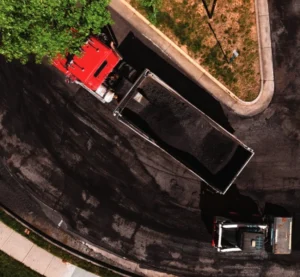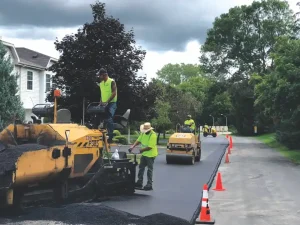Everything has a timeline, and that includes your asphalt pavement. However, you can still improve the life-cycle cost of your asphalt surface. You can extend its life with regular maintenance and timely repairs, including sealcoating.
What Is Sealcoating?
Sealcoating is a layer of defensive pavement coating that protects your driveway, parking lot, or other asphalt surfaces from harmful elements.
Sealants are a mixture of acrylic-based or bituminous liquids. The base is mixed with water, polymer additives, silica sand, and other fillers to achieve the desired formula.
It is advisable to apply it regularly to extend or double the life of your asphalt pavement.
Characteristics of Asphalt Sealants
To pick the best sealant and understand its impact on your pavement, it is important to know the nature of most asphalt pavements:
- It’s waterproof
- It’s flexible
- It is sticky; thus, it does a great job holding all the aggregate together
- If well done, asphalt provides smooth and safe riding for drivers
Benefits of Fresh Sealcoat
Enhance flexibility
As opposed to concrete pavements, asphalt pavements are more ‘flexible’. When trucks and cars drive over, asphalt pavements microscopically flex under their weight. With time, this causes them to become brittle and susceptible to cracks and damage.
By freshly sealcoating your asphalt regularly, your pavement can remain flexible, slowing down the brittleness.
Slows damage from oxidation
Oxidation is the deterioration of the asphalt binder due to UV rays and air exposure. While you can’t stop oxidation, sealcoating can slow it down.
Oxidation causes the binder to loosen, making the pavement brittle and prone to water damage and cracks. If not fixed, the cracks grow more quickly, resulting in structural damage to the pavement.
Sealcoating adds a layer of protection to the binder. This way, the sealer takes the exposure to UV rays and air, not the binder. Regular sealcoating, generally every two or three years, extends your surface’s life. The fresher the sealcoat, the longer the life.
Prevents water damage
Sealers used for sealcoating often contain fine aggregate, filling the hairline cracks (an early sign of ageing).
Sealing these cracks prevents water from seeping into the surface, reducing the chance of water damage on your pavement.
Protection from oils and gasoline
Asphalt is petroleum-based. Therefore, any petroleum-based liquid that spills will essentially bind with the asphalt binder, softening the asphalt.
This leaves the surface open to damage like water damage and cracks. It’s easy to spot oil or gasoline spills as they often leave black spots.
A sealcoat acts as a defensive base over the binder in that if oil or gasoline leaks, it does not come into contact with the asphalt binder but with the sealer.
However, for a sealcoat to work over an already affected area, the surface must be repaired prior. Failure to correct the black spots means the sealer applied will not be effective, as the liquids will have joined with the base of your asphalt.
This means the damage will continue to spread.
Other benefits of fresh sealcoat include:
- Enhances skid resistance
- Makes cleaning easier
- Saves you money
- Extends your asphalt’s life
For more information on commercial pavement services, call us at 703-433-9500 or fill out our easy contact form.



